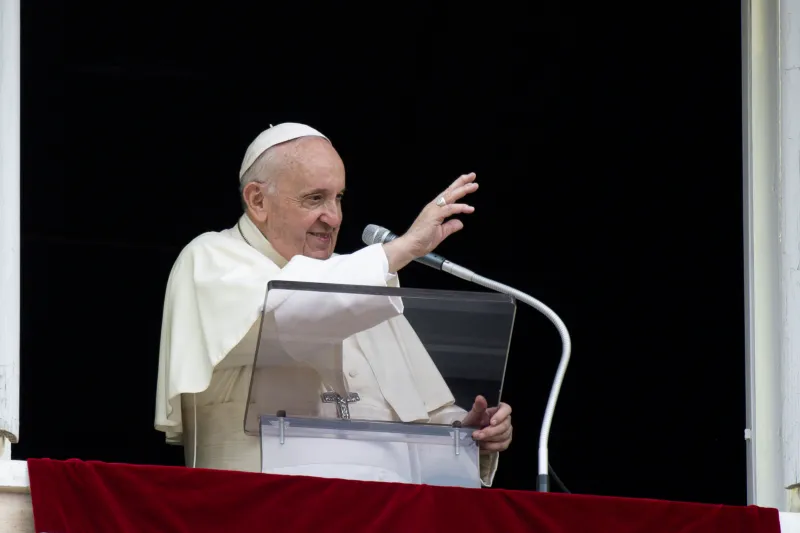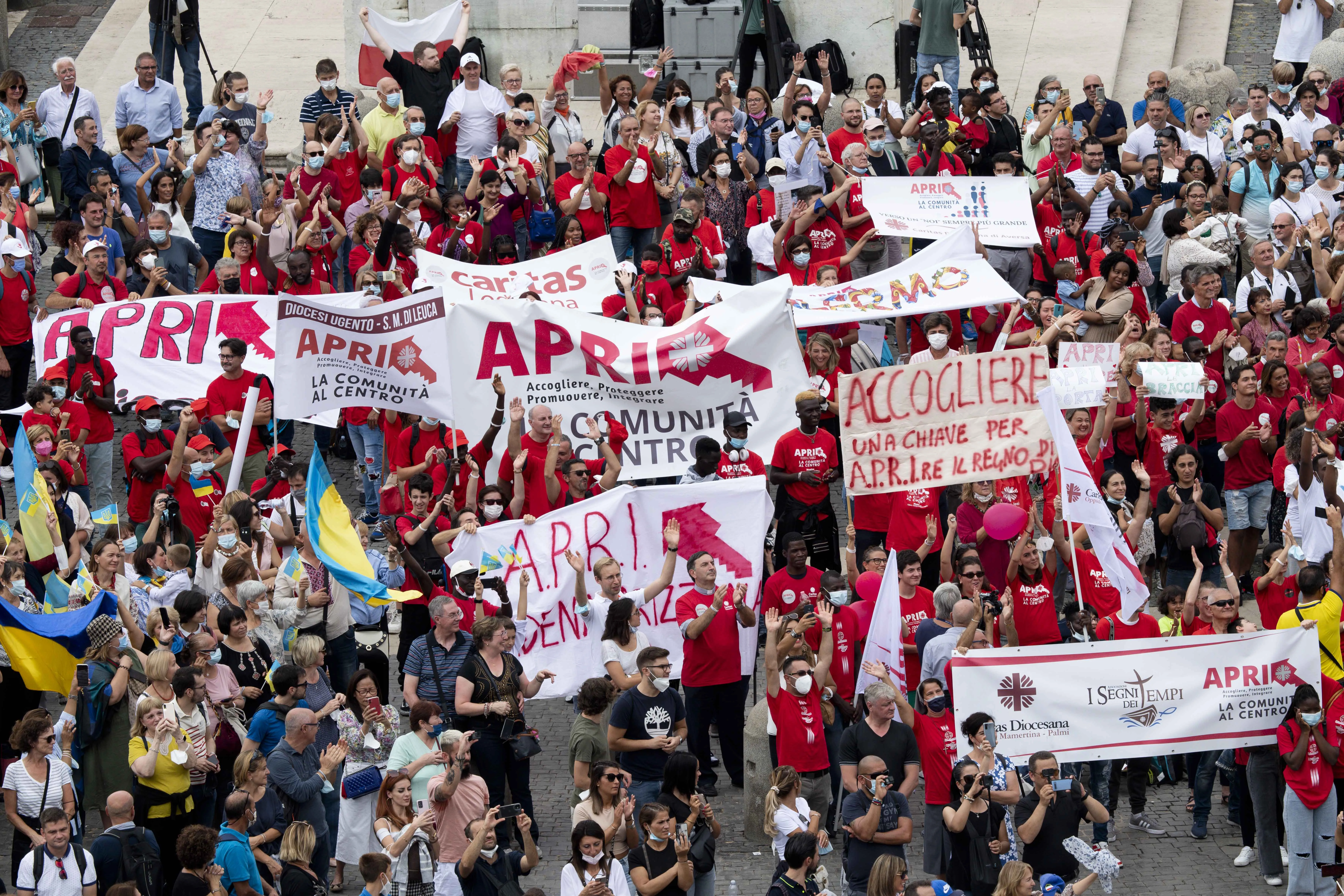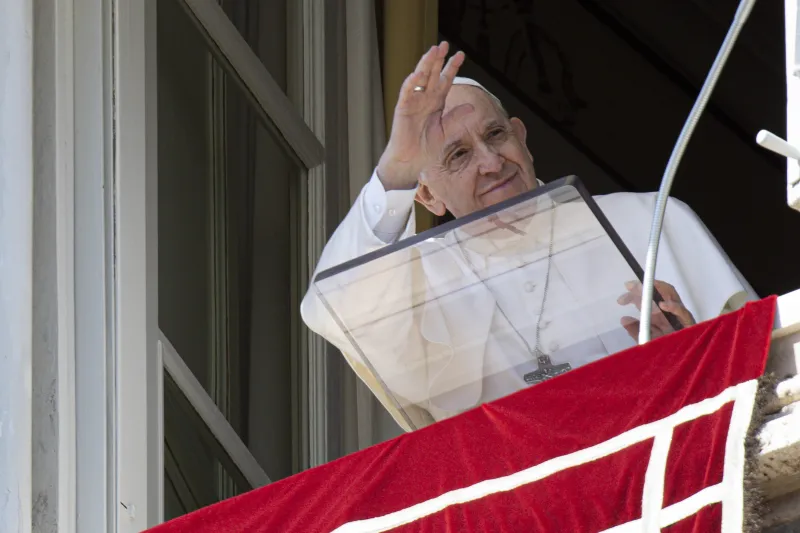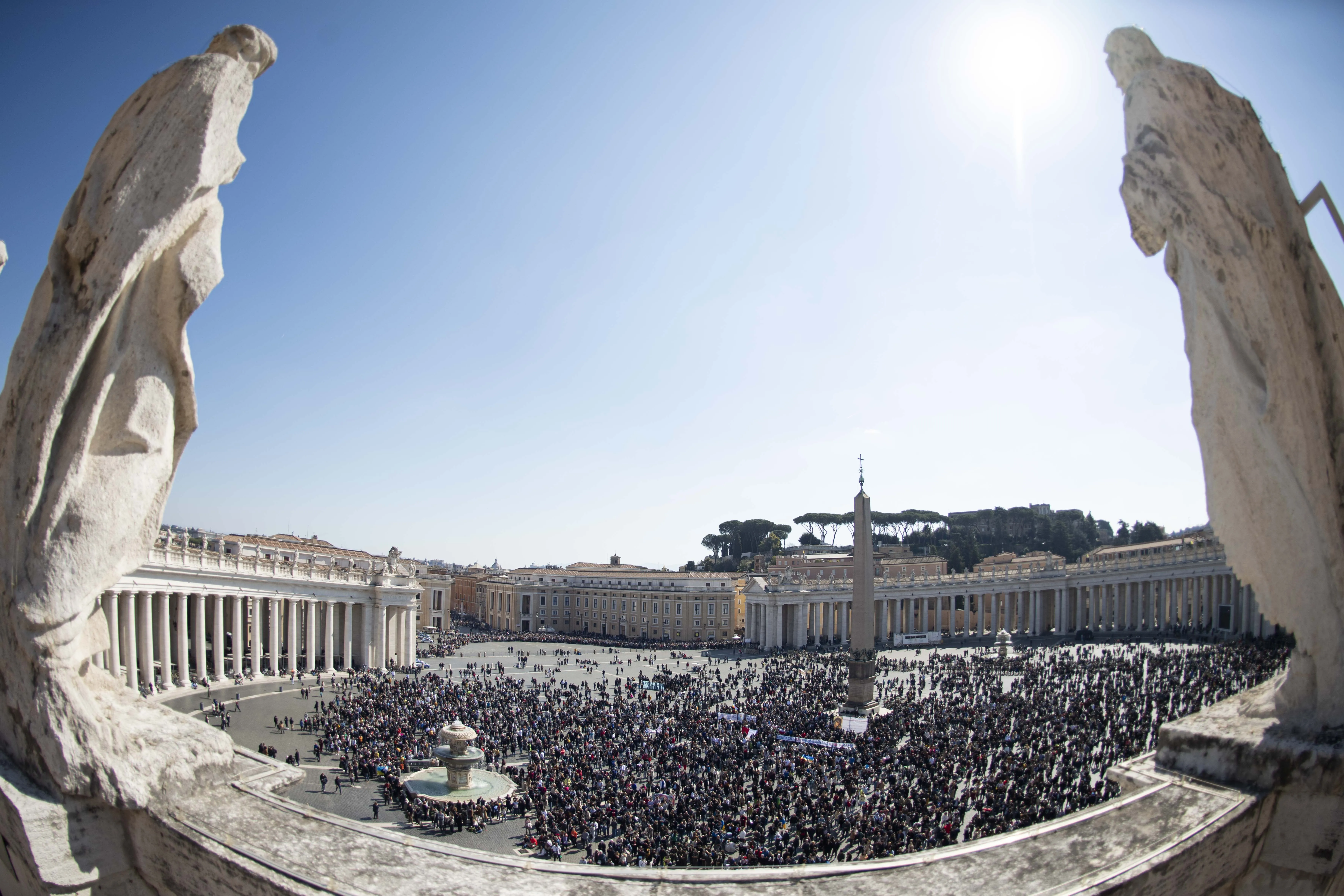
Vatican City, Sep 26, 2021 / 06:35 am (CNA).
Pope Francis on Sunday said the Catholic Church must be open and welcoming toward others, warning that division and exclusion come from Satan.
“We need to be vigilant about closure in the Church too,” he said before leading the Angelus prayer at the Vatican Sept. 26.
“Because the devil, who is the divider – this is what the word ‘devil’ means – always insinuates suspicions to divide and exclude,” he added.
Speaking from a window overlooking St. Peter’s Square, Francis said sometimes Catholics, instead of having humble and open communities, “can give the impression of being the ‘top of the class’ and keeping others at a distance.”
“Let us ask for the grace to overcome the temptation to judge and categorize,” he said, “and may God preserve us from the ‘nest’ mentality, that of jealously guarding ourselves in the small group of those who consider themselves good.”
Pope Francis warned that sometimes there are groups of people, such as a priest and his parishioners, some pastoral workers, or movements and associations with particular charisms which close themselves off to outsiders.
“All this runs the risk of turning Christian communities into places of separation and not of communion,” he stated. “The Holy Spirit does not want closedness; He wants openness, and welcoming communities where there is a place for everyone.”
After leading the Angelus, a traditional prayer about the Virgin Mary, the pope spoke about the Sept. 26 celebration of the World Day of Migrants and Refugees.
He said “it is necessary to walk together, without prejudice and without fear, placing ourselves next to those who are most vulnerable: migrants, refugees, displaced persons, victims of trafficking and the abandoned. We are called to build an increasingly inclusive world that excludes no one.”
Francis greeted several groups with the aim of helping migrants and refugees, which were gathered below him in St. Peter’s Square.

“Thank you all for your generous commitment,” he said. The pope then invited everyone present to visit the “Angels Unawares” sculpture before leaving the Vatican.
The 20-foot-tall bronze statue, unveiled in 2019, is based on Hebrews 13:2, “Be welcoming to strangers, many have entertained angels unawares.”
The sculpture, by Canadian artist Timothy Schmalz, depicts migrants throughout history crowded together on a boat with the Holy Family.
Pointing to the statue in St. Peter’s Square, Pope Francis said, “dwell on the gaze of those people and welcome in that gaze the hope of starting to live again that every migrant has today.”
“Go there, see that monument,” he urged. “Let’s not close the doors to their hope.”

Before the Angelus, the pope also reflected on the day’s Gospel from St. Mark, in which the Evangelist recalls when Jesus said to his disciples: “If your hand causes you to sin, cut it off. It is better for you to enter into life maimed than with two hands to go into Gehenna, into the unquenchable fire.”
Pope Francis said Jesus wants us to stop judging others and to worry about our own behavior first. “Indeed, the risk is to be inflexible towards others and indulgent towards ourselves,” he noted.
“Jesus is radical, demanding, but for our own good, like a good doctor,” he continued. “Every cut, every pruning, is so we can grow better and bear fruit in love.”
“Let us ask, then: what is it in me that is contrary to the Gospel? What, in concrete terms, does Jesus want me to cut out of my life?”
“Let us pray to Mary Immaculate, that she may help us be welcoming towards others and vigilant over ourselves,” he concluded.
If you value the news and views Catholic World Report provides, please consider donating to support our efforts. Your contribution will help us continue to make CWR available to all readers worldwide for free, without a subscription. Thank you for your generosity!
Click here for more information on donating to CWR. Click here to sign up for our newsletter.







There may be a pope and his idolators, some pastoral workers, or movements and associations with particularly unChristian ideologies which close themselves off to outsiders.
It’s all within the realm of possibility.
“Pope Francis said Jesus wants us to stop judging others and to worry about our own behavior first. ‘Indeed, the risk is to be inflexible towards others and indulgent towards ourselves,’ he noted.”
Actually, Matthew 7:2 has Jesus saying, “For in the same way you judge others, you will be judged, and with the measure you use, it will be measured to you.”
Jeremiah 34:17 also speaks to those brutally flexible reeds who see fit to bend the Lord’s commandments and to disregard Sacred Tradition. Jeremiah speaks the judgment of the Lord to those who judge the keepers of the Lord’s commandments and Catholic tradition as unloving and rigid. Yes, they are as rigid as Christ would have them be.
“Therefore this is what the LORD says: You have not obeyed Me; you have not proclaimed freedom, each man for his brother and for his neighbor. So now I proclaim freedom for you, declares the LORD–freedom to fall by sword, by plague, and by famine! I will make you a horror to all the kingdoms of the earth.”
I heard on yesterday’s news that wild boars have invaded Rome.
Pope Francis said Jesus wants us to stop judging others and to worry about our own behavior first.
The Pontiff who is not a theologian, not a liturgist, not a Canon lawyer and fundamentally very poorly catechized in the Catholic faith needs to be reminded that Jesus said otherwise. He also needs to engage in a thorough examination of conscience and amend his own judgmental behavior prior to his demise.
“And why even of yourselves, do you not judge that which is just?” Jesus Christ, Luke 12:57
St Aquinas states that man’s relations with foreigners are twofold: peaceful, and hostile. Therefore, each nation has the right to determine who should be admitted as citizens.
Even the good Samaritan did not take the man who was robbed and beaten with him. He helped him where he lived.
“Artist Timothy Schmalz, depicting migrants throughout history crowded together on a boat with the Holy Family”, is pure schmaltz. It’s art, though the theme is propaganda for a Vatican open border policy that’s destroying national identity. National and ethnic diversity are considered assets to cultural enrichment.
Welcoming, yes, and some would urge, even proselytizing.
But, here’s a side story…’bout a year ago I was early in the church, preparing as a lector, and off the street strolls a totally new young man. Never seen before. The few early parishioners are kneeling. The tabernacle resides, centered, in holy silence.
Off to the side, the newcomer ambles straight to the piano, assumes command, and begins playing as if he owned the place. I first discerned (!) and then suggested, politely, that as a walk-on perhaps he should not presume so much. (This is a parish church, after all, and a few minutes before Mass, and not a high school practice room or home rec room.)
He stops. But before heading back to the open door he approaches and, kicking the dust from his sandals, as it were, judges me and the entire parish over his shoulder: “this place is not very welcoming!”
Should I have offered Its/all/about/Me a doughnut? Should he have hung around for a bit of Eucharistic incoherence? In particular this side story—-examining my own behavior first—-what should I have done differently?
IMO the name you gave him is the answer to your question. The phrase “Be still and know that I am God” suggests itself to me at this point.
I also get the impression that he wanted to be offended so he could deliver bis exit line.
Nothing. Christlike admonition may have saved that pianist from a life of donut Christianity.
Like many, I have a lot of criticisms of Francis, but listening to him carefully he is obviously equating himself to the Devil. Well, I think he should simply go to confession and resolve to sin no more but also stop describing himself in Satanic terminology.’
The Church must be “welcoming”, to whom and what? Sin, heterodoxy, idolatry, leftist ideologies which aim to destroy and subvert the faith? The Chine Totalitarian regime? Certainly not Traditional Catholics, who simply want to celebrate the timeless Mass of Ages undisturbed. Certainly not ordinary Novus Ordo attending Catholics like myself, who were willing to give Francis a chance when he was first elected, and even tried to square his utterances with tradition and scripture, but got turned off of him due to his arrogance, tolerance of corruption (doctrinal, moral, sexual and financial), open contempt for the very people he is supposed to shepherd, refusal to teach the faith as was handed to him by his predecessors (and blatant contradiction of same, whether directly or indirectly).
As Fulton Sheen put it long ago, our problem is that we are too tolerant, not because we are intolerant. We cannot be “welcoming” to sin, error and immorality. We already tried that and it led directly to the McCarrick scandal and the sex abuse crisis.